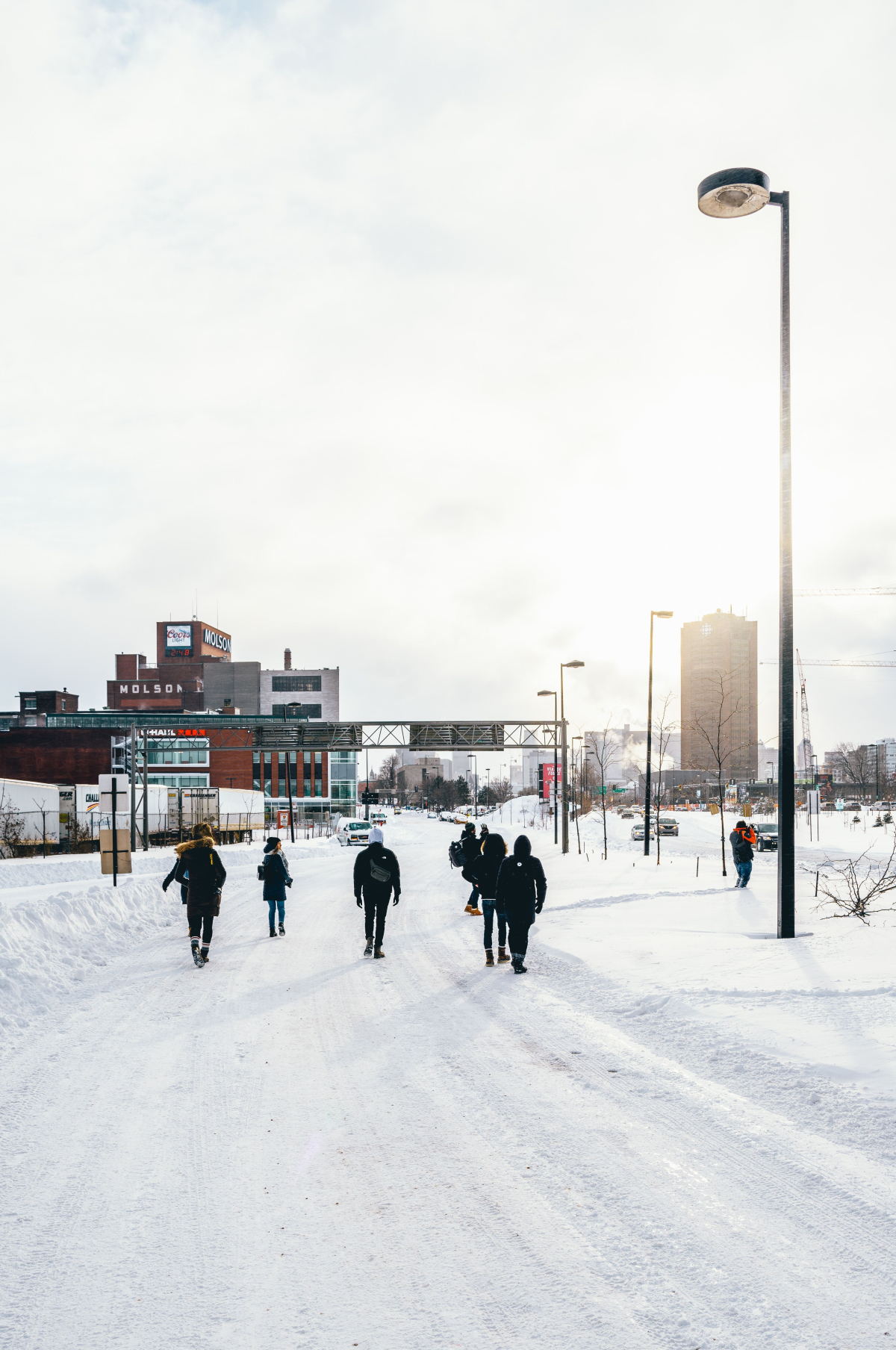Support strong Canadian climate journalism for 2025
That moment when you find yourself having to choose between Montreal streets and Montreal police officers and not knowing which experience will turn out to be worse.
Lateef Martin was walking in the street late last Saturday night because the sidewalks were too icy when the police ticketed him for jaywalking. He’s now contesting the ticket because he’s convinced that race played a major role in the incident.
Before giving the ticket, the police officers who pulled up beside him asked him where he was going. Martin felt there was no reason for the question and refused to tell them, which is his right. He had neither committed a crime nor was he acting in a suspicious manner. He was simply walking home in the exact same way every other Montrealer I know has been doing for the past few weeks, by walking on the street.
Abysmal winter conditions for Montreal pedestrians
To say that city sidewalks have been, at times, skating rinks this winter is an understatement. Erratic weather and extreme temperature fluctuations have wreaked havoc on Montreal this year. We’ve seen record-breaking 40 centimetres of snow dumped on us, days when we frantically navigate huge puddles, only to deal with dangerously slippery slabs of ice a few hours later when the temperatures plummet. Despite best efforts, the City of Montreal has simply been unable to keep up with both snow removal and sidewalk maintenance. Plowing and salting can only do so much against Mother Nature and global warming's new winter “normal."
It’s been so bad that a few weeks ago, Urgences-Santé, the ambulance service serving Montreal, received as many as three times its normal volume of calls because of icy streets. People have been slipping, sliding, and injuring themselves at record rates, forcing the elderly and people with disabilities to avoid going out altogether. As a result, we’ve all taken to the streets, and I mean that literally. Are these seriously the conditions under which our local police force felt it necessary to stop a man from making his way home?
Like every other Montrealer, I, too, have found myself zigzagging on and off sidewalks as I navigate snowbanks, icy patches and messy, slushy puddles. And yet I have neither been stopped nor ticketed by a police officer for doing so. If police are now handing out tickets for walking on Montreal roads, we should have all gotten one by now. But we haven’t, have we?
Walking while black
The thing with racial discrimination and profiling is that in many cases it’s so subtle and manifests in such a way that it can be very difficult to define it as such.
When Lateef’s story made headlines, the comments on social media were quick and predictable. Many questioned his part in all of this. They said that his ticket wasn’t necessarily the result of walking on the street, but the result of insubordination and rudeness. If Martin had simply answered the question, they argued, and not talked back to the police officers that night, he would have most likely been allowed to go on his way. These comments always indicate a desire to minimize or treat such cases as extremely isolated in nature, because to acknowledge that they happen routinely and disproportionately to people of colour is to acknowledge that the Montreal police force has a racism problem. And who wants to admit that?
It’s easy for someone who has never been harassed, stopped, or mistreated by a police officer to assume that such behaviours would never be unwarranted. White privilege dictates that most people will immediately ponder why Martin didn’t answer the question, instead of pondering why he was asked it in the first place. Because, in all probability, if he had been white, it would have never been posed.
I fully admit to having been borderline rude to Montreal police officers more than a few times in my life. Annoyed by having been stopped or ticketed for a minor infraction in the past, I responded curtly to their questions and didn’t think twice about it. While I certainly didn't talk my way out of a ticket, I have faced no additional consequences for such behaviour. I simply haven’t been raised to fear cops because my white privilege has made sure I didn’t have to.
That is not the case for people of colour.
Long history of questionable arrests and abuses of power by police
Montreal police have a racial profiling problem. It’s widespread and it’s systemic and there are far too many cases awaiting a hearing at the Quebec Human Rights Commission for us to treat this and others like it as isolated incidents.
According to a lawyer who was interviewed by the CBC, Martin has a pretty good legal case because the law stipulates that a pedestrian can use the street when the sidewalks are impossible to use, so long as they are not putting anyone in danger. The law also stipulates that Martin was under no legal obligation to tell police officers where he was going or provide identification, since he wasn’t caught committing a crime, he wasn’t driving, and the circumstances did not merit any of those questions. It's fair to assume that the Montreal cops who stopped him knew the law, as well.
In fact, this entire incident appears to be nothing more than a blatant and unecessary abuse of power. Annoyed that Martin refused to answer where he was going, the police officers decided to slap him with a jaywalking ticket.
Why?
Because they could.
But Martin decided he wasn’t having it and is contesting it. And he should! This incident comes on the heels of many questionable arrests by Montreal’s police force. Last spring, a biracial couple was violently arrested for making “excessive noise” while walking down the street. In 2017, Quebec’s Human Rights Commission ordered the City of Montreal and police to pay $45,000 in damages for illegally arresting and detaining a woman for no apparent reason. She, too, was asked to identify herself and when she refused, police officers grabbed her, placed her on the hood of the car and arrested her.
In 2015, Joel DeBellefeuille filed his third complaint in six years with Quebec's Police Ethics Commission, accusing police of racial profiling. In one of the incidents he was pulled over four times in one week alone while driving his new BMW. The reason listed in the police reports (I kid you not) was that he was a black man with a… Québécois name (he’s adopted). What I found most telling in that case was that he later revealed to reporters that since trading in his BMW for a Mazda he hadn't been stopped once since.
Faced with intense criticism and numerous lawsuits over the years, Montreal police recently unveiled a new strategy to eliminate racial and social profiling. It calls for increased transparency, better training of police officers, and the hiring of three independent researchers who will collect and analyze data on racial profiling.
But many remain skeptical. Historically, the Montreal police force, which remains overwhelmingly white and lacking in diversity, has been slow to acknowledge a problem and even slower to address it. Incidents such as Lateef Martin's jaywalking ticket, for simply doing what all of us have been doing to navigate this treacherous winter, has many Montrealers questioning what it will take before racial profiling is seen and dealt with as the persistent problem that it is.





Comments